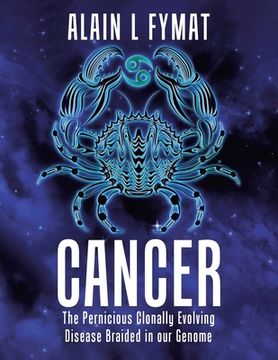Cancer: The Pernicious Clonally Evolving Disease Braided in our Genome (in English)
Synopsis "Cancer: The Pernicious Clonally Evolving Disease Braided in our Genome (in English)"
Cancer is one of the oldest diseases seen in human specimens, quite possibly the oldest, the quest for its cure having begun some 4,000 years ago. However, it was fleetingly rare, hidden by other illnesses such as cholera, dropsy, leprosy, plague, pneumonia, smallpox, and tuberculosis. As these diseases were vanquished, and as the human lifespan lengthens, cancer has emerged. Many diseases are lumped together under the denomination "cancer," because they share a fundamental biological feature, namely abnormal cell growth. However, cancer is not a single disease. It is a multiplicity of diseases caused by the uncontrolled growth of a single cell unleashed by mutations. Cancer cells can grow faster, flourish more profusely, adapt better, recover more rapidly, and repair faster than normal cells. They are in effect more perfect versions of normal cells, and can even become immortal! We naively thought that cancer could be defeated by either preventing mutations from occurring in normal cells or else finding the means to eliminate the mutated cells without compromising normal growth. Unfortunately, this view did not take into account the pernicious genetic intertwining of normal and cancerous growths. Woven into our genome, the mutated genes are but distorted versions of the normal ones; they are braided together, and unbraiding them continues to be the most formidable undertaking. Fortunately, the vast majority of cancer cases are due to environmental risk factors, many of which being controllable lifestyle choices, and thus preventable. In developing cancer, individuals differ in both their inherited tendency and exposure to the environment. This book presents the nine major recent developments in cancer treatment, which provide great hope for the future. These include innate immunotherapy with neutrophil-mediated drug delivery for the suppression of postoperative malignant glioma recurrence; synthetic immunotherapy using either chimeric antigen receptor T-cells or programmed-death inhibitors; DNA origami/Trojan technique to foil drug resistance in solid tumors; enzyme mnk-2 conversion to overcome drug resistance in breast, lung and colon cancers; antiangiogenesis to cut off the blood vessels alimenting the cancer cells; self-eradication of cancer during meiosis; combating inflammation to limit tumor invasion, progression, and metastasis; electropermeabilizing the cancer cell membrane to deliver drugs to the cell's interior; and employing nanochemotherapy to deliver nanoparticles encapsulating cytotoxic drugs to tumors.

